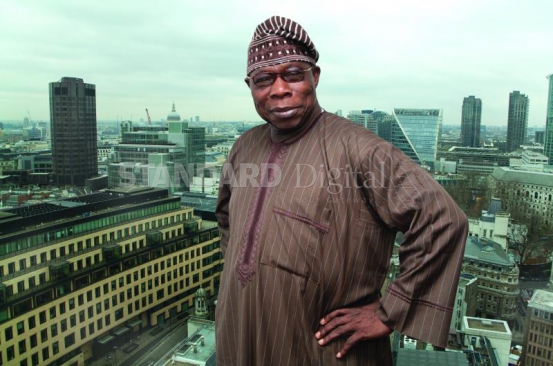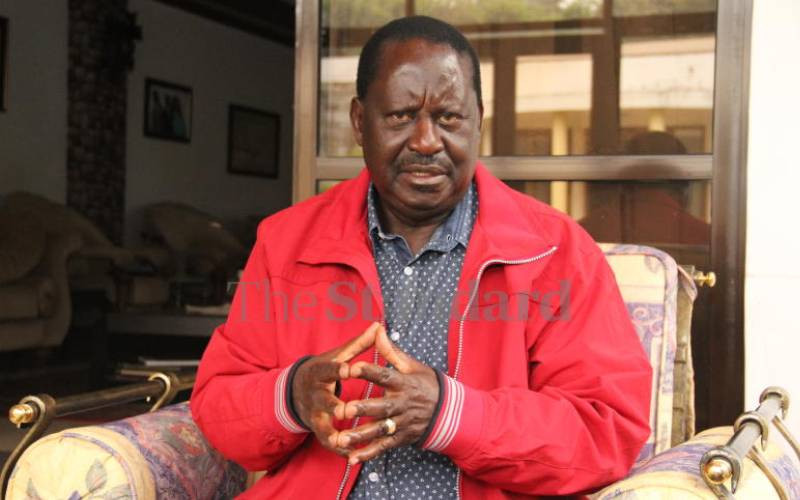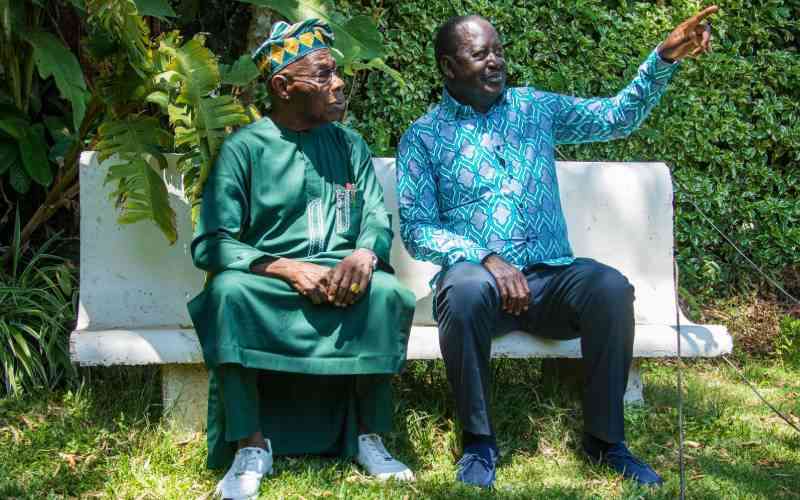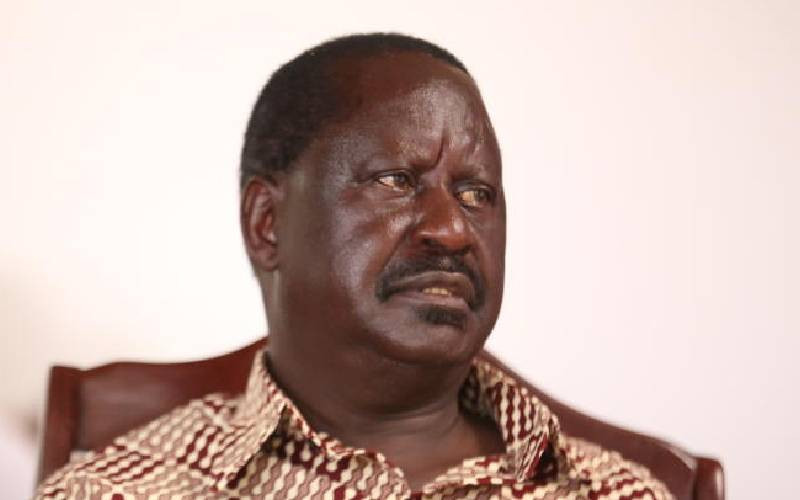
NAIROBI: On December 1, last year, Nigeria’s billionaire Tony Elumelu was hosting a cocktail party to a group of journalists in Lagos. Then all attention diverted from him as an agbada-clad Olusegun Obasanjo made a dramatic entry accompanied by dark suited bodyguards.
The two-time president of the West African nation, first as a military ruler, 1976 to 1979, and as democratically elected president, 1999 to 2007, then gave a charming speech that disarmed the analytical and critical journalists present. A week later, the same journalists would tell a different story.
The septuagenarian general would release a tell-all autobiography, My Watch, that was immediately banned for allegedly libelling the powers that be.
One of the leaders mentioned in the book is Jonathan Goodluck, who in February 14, will be facing a stiff competition for the presidency in the general election against Muhammadu Buhari.
In an interview with Radio France International after the December 9, 2014, launch of My Watch in Lagos, Obasanjo says that it was his publisher’s decision to release the book before the elections.
In an in-depth review by Patrick Okigbo of Nextier, a policy analysis publication, Obasanjo unflinchingly says that the president, Dr Goodluck Jonathan, has failed Nigerians.
COLOSSAL FAILURE
Okigbo, who writes that Obasanjo requested he review the book, adds that Obasanjo leaves no one in doubt that he considers the current administration “inept and a colossal failure and wishes to see some significant changes.”
It should be noted that it is Obasanjo who, after his two terms as president, 1999 to 2007, fronted Umaru Yar’Adua as his successor.
Yar’Adua would die in 2010 and the vice president, Jonathan took over.
Obasanjo is also critical of many other key Nigerian figures including Abubakar Atiku, his vice president, 1999 to 2007, Bola Tinubu a governor of Lagos State in the same period and Buruji Kashamu.
Kashamu is a campaign director in Jonathan’s People’s Democratic Party. He has been indicted in the US for a drug smuggling racket, and for this, Obasanjo in the book criticises the relationship between the president and Kashamu.
Kashamu had on December 7, obtained an injunction to stop My Watch launch. After the launch, in December 10, a federal judge in Abuja banned the book, and ordered for confiscation of copies already in sale. As a result, reports some of the Nigerian media, the book is being sold clandestinely.
And now, according to the publisher, Kachifo, Obasanjo will be launching the book in Nairobi on February 9, at the Serena Hotel.
Stay informed. Subscribe to our newsletter
HIS EARLY LIFE
Kachifo, who has published popular books including Kenyan Binyavanga Wainaina’s Nigerian edition of ‘One Day I will Write About this Place’, says Obasanjo chose Kenya as his first country of launch because of its prominence in East Africa.
“He will visit several other African countries and Europe in a bid to popularise and market this insightful book.”
The publishers told The Standard on Saturday that the 1,572-page memoir is divided into three volumes, with the first one covering Obasanjo’s early life and his time in the military.
Volume two is based on his political and public affairs life with the last volume titled Now and Then.
When he gets controversial in the pages, he not only hits on politicians but on other notable Nigerian personalities like Nobel laureate Wole Soyinka.
SIGHTS AND SOUNDS
Obasanjo charges that Soyinka is not qualified as a political critic.
As soon as the book was out, Soyinka lashed back in a piece titled, Watch And Pray, Watch and Prey, accusing Obasanjo of shamelessly telling lies.
No matter, the book is well written, with the narrative flowing flawlessly with Obasanjo vividly recollecting sights and sounds and even conversations he had ages ago.
Biographies generally tend to be boring, autobiographies even more so, unless adequate care is taken to spice them up with personal reminiscences,” he writes in the introduction, “If my writing does not excite, sensitise, and motivate you, wake you up with a blow to the head, inspire and energise you into serious thinking and rethinking and galvanise you into action and reaction, then it has not achieved much”.
EZEKIEL 33:7-9
The title, My Watch, is derived from Obasanjo’s reference of self as Nigeria’s “watchman”, and borrowed from the Bible, Ezekiel 33:7-9.
He goes into great detail to explain the reasoning behind the country’s first three coups in which he played critical roles, his ascension to the presidency in 1976, and handing power to the country’s first democratically-elected President Shehu Shagari.
As the Nigeria’s watchman, Obasanjo, who paints himself as deeply religious, portrays his participation in earlier military coups in Nigeria as necessary thus he has to be always alert, spot danger and raise the alarm as necessary, or he must attack the intruder and be part — and indeed be in the vanguard —of the defending force”.
Many historians will, of course, disagree with this assertion and already, the book has raised a storm in Nigeria.
But if anything, My Watch offers a glimpse into the making of an African statesman, in an African powerhouse; rich of oil and boasting of the most population made of colourful people but tainted with military coups, civil war and endemic corruption.
 The Standard Group Plc is a
multi-media organization with investments in media platforms spanning newspaper
print operations, television, radio broadcasting, digital and online services. The
Standard Group is recognized as a leading multi-media house in Kenya with a key
influence in matters of national and international interest.
The Standard Group Plc is a
multi-media organization with investments in media platforms spanning newspaper
print operations, television, radio broadcasting, digital and online services. The
Standard Group is recognized as a leading multi-media house in Kenya with a key
influence in matters of national and international interest.
 The Standard Group Plc is a
multi-media organization with investments in media platforms spanning newspaper
print operations, television, radio broadcasting, digital and online services. The
Standard Group is recognized as a leading multi-media house in Kenya with a key
influence in matters of national and international interest.
The Standard Group Plc is a
multi-media organization with investments in media platforms spanning newspaper
print operations, television, radio broadcasting, digital and online services. The
Standard Group is recognized as a leading multi-media house in Kenya with a key
influence in matters of national and international interest.









